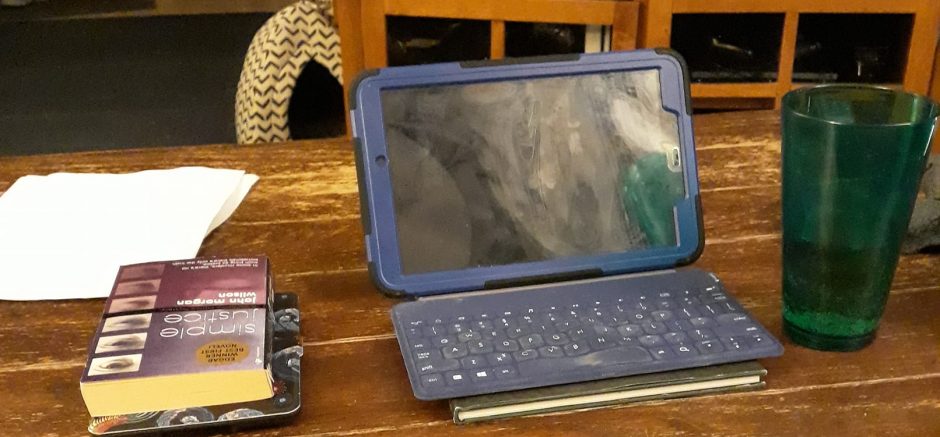Last night's storm raged for four hours. A friendly warm sun and brilliant blue sky coaxed me outside with the promise of new growth in the garden.
I inspect my pepper and bean plants first. The peppers are thriving. One even has a shy pair of white blooms nestled beneath a protective green canopy. In a month, they'll be glossy sweet pepper fruit. All but the tallest of the bean plants survived the blowing rain intact. I found it bent at the soil line, a casualty of hard rain, gusty wind, and its own fragility. I lift its limp body and prop it against the bean pole, hopeful it will recover.
I head for the tea rose section. Unattended for a year, the kerria japonica vine is smothering the north corner. It's an attractive plant with nickel-sized yellow pom-pom flowers generously sprinkled on a lush green background. I haven't pruned it since last summer. Rigorous cancer treatment required that my energy remain focused on repairing and healing my body.
The kerria has flourished during my absence. As I cull unwanted growth, I envision my immune system as a distracted gardener who got lazy and permitted cancer to grow first—just in one small corner—and soon the aberrant cells took over. My body's gardener tended a distant orchard and, when it returned, was unable to stop the growth that had taken over my left breast.
As I cut back the kerria, I discover four tiny green rose buds at the ends of long spindly shoots stretching from a rose bush barely the size of a cantaloupe. Somehow this minuscule, pale pink tea rose survived despite my neglect. The rose won awards for its beauty once. Now it's shapeless and wild.
I'm ruthless with the kerria, trimming it back to its assigned three-square-foot section. With the vine curtailed, the rose now stands in a clearing. The scraggly shoots with their miniature pea-sized buds remind me of antennae. The plant relays a desperate signal to the sun: Feed me, save me; I want to live.
A rosarian would say it's no longer a rose bush, yet the blooms smell as sweet as ever.
My left breast itches and I rub it gently after removing my gardening glove. The skin is raw and swollen from a summer of radiation treatments. Seven weeks of radiation treatments destroyed my ability to perspire in the affected area. Heat builds until I consciously provide an outlet for its release.
My rubbing doesn't provide relief; instead, it sets off a chain reaction of more intense itching. It itches, I rub. It itches more.
I gather the clippings and build a neat stack at the curb. The prickly sensation in my breast is more intense now—maddening, really. Under my straw hat, my hair is damp. I can't help imagining the dry San Diego climate. We left San Diego and returned to West Virginia; six months later I was diagnosed with breast cancer. The high desert's thirty percent humidity would be kinder to me. West Virginia's sodden summer air forces perspiration to collect.
Moisture clings to the skin until gravity takes over. Rivulets of perspiration slide down my face and neck. I pile on the last of the kerria cuttings and quit for the day. The heat and humidity have won.
I go indoors after setting my gloves and hat on a tower of unused clay pots. My eyes adjust to the dim light, and I'm momentarily refreshed by the cool air inside the house. In another hour I'll need to turn on the air conditioner, but right now it's comfortable.
I enjoy a tall glass of ice cold water before taking a shower. The cold liquid fills my mouth then slides down my throat until my body's heat defeats it and I can no longer sense the coolness inside me. I press the glass against the hot flesh under my shirt, stealing a moment of relief until the cool water of the shower can soothe my overheated breast.
A few minutes later, I'm standing under the strong stream in the shower, lathering up with lavender-scented soap—a gift from my mother-in-law—which reminds me of the kerria vine she gave me.
"It'll take over if you don't watch out."
My fingers smooth across the angry red scars on my chest. I close my eyes and concentrate on the water that beats down on my back.
Already, I feel better.
I won't know until tomorrow if the bean plant survives. The tea rose won't win any contests for a year or two, but for now it's safe.
I'm back on the job, and I think they'll be just fine.
 Ginger Hamilton Caudill lives, loves, and learns near Charleston, West Virginia. Her fiction and creative nonfiction can be found throughout Internet publications as well as in more than half a dozen anthologies. After a six-year hiatus from writing following a stroke, Caudill is back to producing her unique brand of writing.
Ginger Hamilton Caudill lives, loves, and learns near Charleston, West Virginia. Her fiction and creative nonfiction can be found throughout Internet publications as well as in more than half a dozen anthologies. After a six-year hiatus from writing following a stroke, Caudill is back to producing her unique brand of writing.





